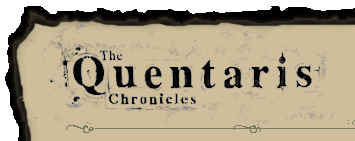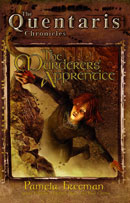 |
|
 |
|
| |
|
||
| |
|||
| |
|
|

The Murderers’
Apprentice - Pamela Freeman
I've often thought about using the information I had and the sense of the time I'd developed in a book, but never did anything with it until I was asked for a book set in the Quentaris universe. One of the things I really liked about the Quentaris series was the ability it gave writers to explore other worlds in a science-fiction kind of way while still having magic to play with. So I wanted to juxtapose a very industrial/technical world with the fantasy one of Quentaris, and thought of my industrial revolution research as a background. I had to shift the technology to volcanic steam power so that I could create a threat to Quentaris (got to have one of those!) but as far as I know, there's nothing impossible about the kind of technology I describe. The steam engines, the social conditions and the work at the mill are exactly what you would have found around 1780 in Britain, say in a place like Bradford. Like her father and mother before her, Merrith is apprenticed to become an assassin with the Murderers’ Guild. But Merrith is hopeless with a dagger and sword, inept at mixing poison, and doesn’t like the idea of killing people anyway. Then a prophecy from the Soothsayers’ Guild says Merrith must join an expedition to the rift caves, or Quentaris will be destroyed. Can Merrith save Quentaris – even if it means she must become a professional murderer? Pamela Freeman started writing stories for children while she was a scriptwriter at the ABC. Her work, which includes The Willow Tree ’s Daughter, Victor’s Quest and Pole to Pole, has been short-listed for the NSW Premier ’s Literary Awards, the Children ’s Book Council Book of the Year Award for Younger Readers and the Koala Awards. They were behind her. Merrith could hear the soft footsteps keeping pace with her own. Two, at least, maybe more. She looked around quickly, but they weren’t in sight. The narrow street was empty, the shop fronts in this street of tin smiths closed up, everyone inside eating dinner or getting ready for bed. She increased her pace, and behind her the footsteps got faster, too. She slid around a corner into a wider street with a few people straggling home from the market, baskets full. She took a breath and slowed down. They wouldn’t attack her right out in front of everybody. She checked her pockets. Not much that was useful. String, of course, some nails stuck to a magnet, chalk, a handkerchief, a few coins. Nothing useful. She’d better run. Instinctively, she set off towards home, her aunt’s place in the Street of Weavers. But as her feet started to smart from the sting of hard cobbles against her thin-soled boots, she realised that leading her pursuers there was the last thing she wanted to do. They were behind her, running now too. Two sets of footfalls, loud in the quiet street. They were gaining on her. There was an alleyway to the left. Merrith knew that down there was a ladder against one wall of a dyer’s shop which let the dyer take her cloth up to the roof to dry, but she only considered that way of escape for a second. She and the roofies didn’t get on. They called her a clodhopper and she thought they were a bunch of useless parasites. Well, maybe that was a bit strong. But they didn’t do much to earn their bread and they acted so superior to everyone else. Concentrate! she told herself. Or you’ll be dead by morning. |
|||||||||
|
||||||
